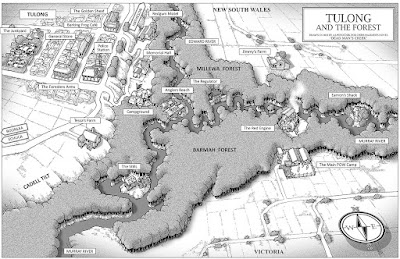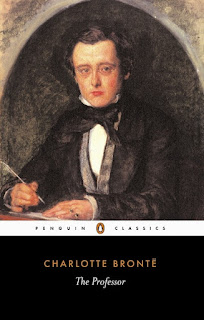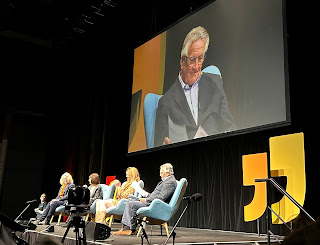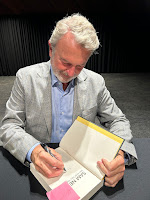On Saturday 27 May 2023 I was joined by my festival friend, who flew up from Melbourne to attend the Sydney Writers' Festival. Together we saw a bunch of fantastic sessions.
Beginnings: Jennifer Robinson
Human rights lawyer Jennifer Robinson is best known in Australia for representing Julian Assange. She is a strong advocate who I have tremendous admiration for, so I was pleased to have the opportunity to hear her speak on the Curiosity Stage as part of the Beginnings series on Crimes and Histories. She read for five minutes from her book
How Many More Women? Exposing how the law silences women (2022) which she co-authored with Keina Yoshida. The section she read was about a woman in the UK who wrote about the domestic violence she experienced on Facebook and her husband sued her for libel. As Robinson read this section my rage metre boiled over. It reminded me of
The Hidden Gender of Law (2002) by Regina Graycar and Jenny Morgan which I read when I was at law school.
Crime and Justice
I was so looking forward to this panel as it featured my favourite Australian writer, Helen Garner, and Hedley Thomas, the journalist who created
The Teacher's Pet podcast I am obsessed with. The session was chaired by Sarah Krasnostein.
Helen Garner has written a few books about a true crime case including The First Stone (1995), Joe Cinque's Consolation (2004) and This House of Grief (2014). Krasnostein started by asking them what sparks interest in a story?
Garner spoke of the ambiguity, not knowing whether or not the person was guilty. In This House of Grief which followed the case of a man convicted of murdering his three sons by driving a car into a dam, Garner could not comprehend how someone could commit such a crime and was intrigued as the man was not a monster. She would not have written about the case if he was.
Thomas on the other hand knew Chris Dawson, the man at the centre of his investigation 'was a bastard'. There was no question in his mind of Dawson's guilt of the murder of his wife Lynette Simms in 19982.
Krasnostein asked them how they handled the long periods in which nothing happened. Garner is a journal keeper and she wrote daily of her reactions to the story, which helped her when it came time to write. Thomas has started investigating the matter decades before and filled a box of files which he left in the roof of his carport. He had mulled it over for a long time and eventually decided the time was right to pull the story together. He started a podcast in 2018 which snowballed as more witnesses came forward as episodes aired.
This was a fascinating discussion about journalism and justice. Thomas is currently writing a book on the Dawson case which I am eagerly anticipating. Garner has become obsessed with AFL as she takes her grandson to his matches. She is a Bulldogs fan and may write something about this. I am not a fan of sports ball, but Garner can make anything interesting.
Unfortunately, Garner did not attend the booksigning afterwards.
Pip Williams: The Bookbinder of Jericho
I am currently reading
The Dictionary of Lost Words (2021) and had hoped to have finished it prior to seeing Pip Williams at the festival, but alas.
In this session, Williams was interviewed by Cassie McCullagh about her newest 'companion' novel,
The Bookbinder of Jericho (2023). While I had seen Williams the day before as part of the panel on historical novels, the content of this session was entirely different. She explained that this novel is set in WWI and as the men enlist to fight in the war, the women have to take up occupations to keep the country running.
Twin sisters Peggy and Maude work at the bookbinding department at Oxford University Press. Their job is to fold and gather the pages that will be sewn together to make books. Peggy is keen to read these books, but only accesses sections in this factory-like setting. Oxford is divided into town (workers) and gown (university) and she is very much on the town side, but looks longingly across the road to Somerville College where women learn. When European refugees arrive in Oxford fleeing the war, Pegg's mind is opened in new ways.
Williams explained that she wanted to write about working class women who were largely invisible. Her process was to write at least one word per day so she always feels she has made progress and has a sense of achievement.
McCullagh asked her about the success of The Dictionary of Lost Words. Williams explained that it sold beyond expectations, has been translated into dozens of languages, turned into a play and now optioned for a TV series. She said she gave the playwright and the screenwriters free rein, as she feels it is important that they adapt the story in their own ways. Williams says she plans to write a third companion novel, but wants to do something different first.
Panel: The State of the Art
I chose this panel as I really wanted to see Richard Flanagan (The Narrow Road to the Deep North), in conversation with Eleanor Catton (Birnam Wood), Colson Whitehead (Harlem Shuffle) and Tracey Lien (All that is Left Unsaid). This session was chaired by Kate Evans.
Evans began by asking each of them 'What is the state of your art?'. As a debut novelist, Lien spoke about moving from journalism to fiction writing. Colson spoke about wanting to try new genres. Flanagan and Catton also spoke about wanting to evolve in their writing and try new things.
They were asked about threats to the novel by artificial intelligence. Lien gave an excellent answer to this, explaining that ChatGPT will never give the soul needed to a novel. Evans asked Whitehead about censorship and the book banning that is happening across America. Whitehead explained he is more fearful of the impact of gun violence, while Catton said this kind of censorship can happen anywhere. Flanagan said the greatest threat to fiction is the lack of funding for the arts and the monopoly of booksellers like Amazon which drive down the wages of writers.
Evans concluded by asking about the future of the novel. All authors were optimistic about the state of the art. This was an intelligent, thoughtful discussion and it was wonderful to have these novelists together on stage.
Sam Neill: Did I Ever Tell You This?
We then raced into the city to the glorious Town Hall to hear Sam Neill in conversation with his dear friend Bryan Brown about Neill's memoir Did I Ever Tell You This?
Brown started by asking him about why he wrote a memoir. Neill explained that he was diagnosed with cancer and her wanted to write stories of his life for his children. So he wrote memories about his childhood, his parents, the early days of Australian cinema, and his brilliant career.
Neill spoke about career highlights and lowlights, telling tales about when he got the call from Spielberg about
Jurassic Park. The two men spoke about the 1970s and 1980s in Australian cinema and their mutual friends Wendy Hughes, Roger Donaldson and others who impacted their careers.
What I loved about this session was the mateship between the two men and their deep love and affection for each other. They had a genuine banter and were able to tackle both the serious and frivolous in this session.
After the session I met Sam Neill when he signed a copy of his book for me.
Book Signings
I have met a lot of writers and had many books signed over the year's but tonight's book signing was awesome. Sam Neill signed a copy of
Did I Ever Tell You This? There was a very long queue and I believe I was around #70 in the line. He was a genuinely likeable man, giving time to each person he met. He asked me what I had been doing that day and I explained I had been attending the festival all week. He then asked for my expert opinion on his session, 'was it any good?'. I told him it was pretty good, top five maybe. I told him Bryan Brown was excellent and I look forward to Brown writing a memoir, which gave him a laugh. I ended up leaving Town Hall well after 10pm - so in all a huge day at the Festival.
Read more about my SWF2023 here:
- SWF2023 - Overall impressions
- Day One - Bernardine Evaristo; Shehan Karunatilaka
- Day Two - Sophie Cunningham; Anne Casey-Hardy; Fiona Kelly McGregor; Brigitta Olubas; Robbie Arnott; George Monbiot; Sarah Holland-Batt; Jane Harper; Richard Fidler; Peter Frankopan
- Day Three - Geraldine Brooks; Sally Colin-James; Pip Williams; Eleanor Catton; Raina MacIntyre; Clementine Ford; Colson Whitehead
- Day Four - Jennifer Robinson; Hedley Thomas; Helen Garner; Sarah Krasnostein; Pip Williams; Richard Flanagan; Eleanor Catton; Colson Whitehead; Tracey Lien; Sam Neill; Bryan Brown
- Day Five - Barrie Cassidy; Laura Tingle; Niki Savva; Amy Remeikis; Margot Saville; Simon Holmes A Court; Helen Haines; Margaret Simons; Paddy Manning; Kerry O'Brien; Thomas Mayo











































